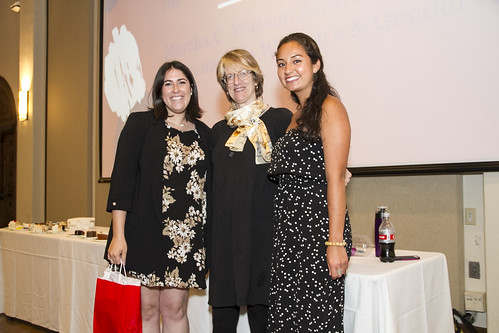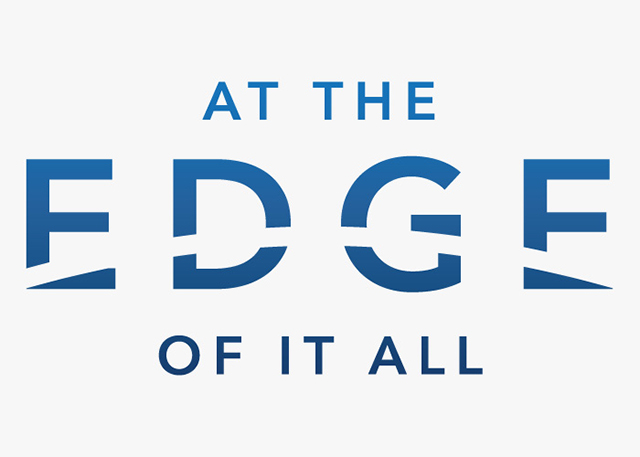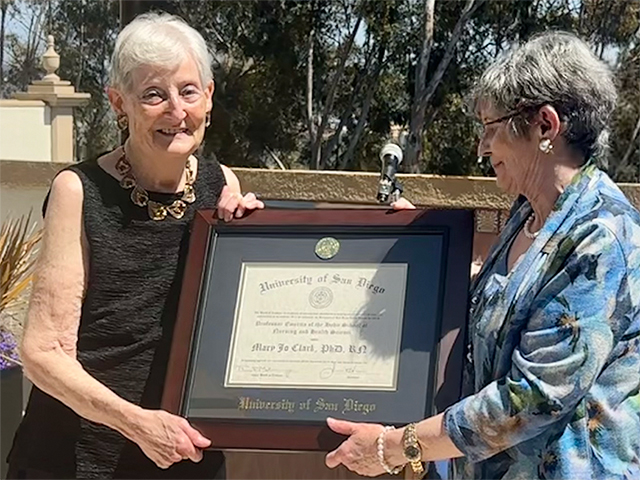Celebration, Inspiration, Solidarity for Women at 23rd Annual Banquet
An empowering and celebratory show of solidarity, well-earned recognition for one retiring University of San Diego professor, impressive student research and a look back at the past year in the Women’s Center and the Women’s and Gender Studies (WAGS) academic program were all part of one important event Wednesday night in the UC Forums.
The 23rd annual Women’s and Gender Studies and Women’s Center Banquet produced a strong program all around, beginning with research poster presentations given by seven USD students from the Women’s and Gender Studies Minor. Welcomed by Anne Koenig, director of the Center for Educational Excellence, she gave the evening over to Evelyn Kirkley, WAGS director, who shared short- and long-term goals for the program.
Honoring a USD Scholar, Pioneer
After dinner, retiring Theology and Religious Studies (THRS) Professor Dr. Maria Pilar Aquino, S.T.D., who has taught at USD for the past 25 years, was honored. Flanked by several family members, she was feted by reflections from Dr. Emily Reimer-Barry, Chair of THRS, and Kirkley. She was presented with gifts, including a USD logo-engraved chair with her name and the announcement of a new scholarship in her name was made to a standing ovation for Dr. Aquino.
“You cannot read a book about feminist theology that does not cite her work,” said Reimer-Barry. “Her legacy is powerful, indeed.” A long table displayed books that Aquino wrote, contributed to and had cited her work alongside cherished photos through the years. One of her books, “Our Cry for Life: Feminist Theology for Latin America,” has been translated in six different languages. Her involvement in USD academics, student organizations and her teaching and research excellence has earned her USD’s highest faculty honor, the University Professorship, a Steber Professorship and two USD Women of Impact Awards. She has always been a compassionate colleague, too.
“To students she was the one who taught Introduction to Catholic Theology, Catholic Social Thought, Peacebuilding and Reconciliation and Feminist Theology,” Reimer-Barry said. “Known as a rigorous teacher with high expectations for students, many have expressed transformative and life-changing experiences in her classroom. She challenged students to consider deeply the methods of Catholic theology and the relevance of social ethics to lived experiences of undergraduates. … She’s a scholar and a pioneer in her field.”
Women’s Center Recap, Student Awards
It was a perfect segue to hear about the 2017-18 year that was for USD’s Women’s Center. Director Erin Lovette-Colyer shared a video with various highlights and events done through the center. She noted milestone anniversaries for the Women’s Empower Leadership Retreat (10 years) and the Women of Impact Awards (20th).
Graduating seniors were recognized as well as three students who received awards: The Dr. Linda A.M. Perry Award for Outstanding Achievement and Dedication to the Women’s and Gender Studies Program went to Amy Maltz and Samantha O’Brien; the Martha C. Watson Award for Academic Achievement in Women’s and Gender Studies went to Kayla Beauregard.
Women’s and Gender Studies Research
A closer look at the research presented by seven WAGS minor students:
• Jennifer Castro Garcia, economics major and military veteran, did a report titled, “What Recruiters Don’t Tell Your Daughters,” referencing high instances of sexual assault, institutionalized gender biases and healthcare struggles for service women, a look at cultural influences and hyper-masculinity.
• Margaret Gienko, political science major, focused on “From One Gender Gap to an Another: U.S. Women’s Political Engagement.” She looked at the adolescent gender gap for political engagement, stating that men at an early age tend to learn about politics through conflict while women learn through more civil environments. She looked at female political ambition, female political pathways, an examination of gender in political media circles, a gender gap in voting and a closer look at women who hold political office and their results.
• Benson Delos Reyes, behavioral neuroscience major, asked, “Who Can I Look Up To?: An Exploration of Queer Film Representation.” Reyes looked at the historical context of LGBTQ+ Characters in Film, examined positive and negative effects of LGBTQ+ characters on viewers and offered thoughts on improving credible representation.
• Allyan Hai, political science major, examined, “For Women are Rights: Patriarchal Interpretations and Feminist Reinterpretations of Islamic Scriptures.” Hai’s work looked at problems associated with patriarchal misrepresentation of Islamic scripture and the role of women in Islam, family laws, the costs associated with gender discrimination against Muslim women, resisting and seeking alternatives and a few solutions to consider.
• Charlotte Horine, communication studies major, looked at female superheroes and gender stereotypes existing in the entertainment industry. Titled “It’s a bird, it’s a plane, it’s gender stereotypes,” Horine looked at the history of women in Hollywood, portrayal of strong women, findings of a male-dominated Hollywood and on the importance of women having a stronger presence in Hollywood.
• Amy Maltz, Ethnic Studies major, WAGS and Theology and Religious Studies minors, researched “Heteropatriarchy or Healing?: Jewish Nationalism and Narratives of Identity.” Maltz looked at Jewish Nationalisms, the three pillars of White Heteropatriarchy (Eurocentrism, Settler Judaism and Militarization), the deconstruction of these pillars, the framework and methods used and the chance to build new narratives.
• Sam O’Brien, psychology major, researched, “Reasonable Womxn Fighting Words: Street Harassment and the First Amendment.” Street harassment is unwanted sexualized speech and/or behavior enacted by men in public places toward womxn who are strangers. She also referenced the Fighting Words doctrine, which is a constitutional limitation that removes protection from speech when abusive language does such things as inflicts injury, incites a breach of the peace, doesn’t contribute to the social/political commentary, is directed at a specific person, lead a “reasonable man” to be provoked to fight, undermines the social interest in order and morality (i.e. harms), which is greater than the social value (i.e. benefits) obtained by the speaker. She brought up points for discussion and future directions.
It was both a night to celebrate the powerful presence and work of women at USD and a chance to continue the conversation about ongoing work necessary for female and gender equality and equity in all aspects of life.
— Ryan T. Blystone




